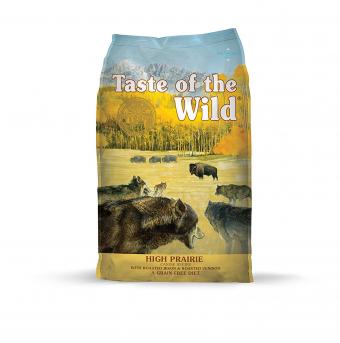
A grain-free diet is a popular alternative to mainstream dog food. Proponents of grain-free dog food consider it hypoallergenic and closer to a dog's natural diet than the average dry and canned dog food.
Benefits of Grain-Free Dog Food
Grain-free dog food, both dry and canned, generally has a higher meat and protein content, fewer carbohydrates, and more digestible animal fats than the average dog food with grain ingredients. Grain-free pet diets originally emerged to help dogs with food allergies, sensitive stomachs, and obesity. Also, some pet owners and holistic veterinarians believe grain-free food matches a dog's ancestral diet more closely.
Grain-Free Rationale
Dogs with health conditions like allergies, celiac disease, canine inflammatory bowel disease or a predisposition to bladder stones, may respond better to a grain-free diet. Some dogs also have difficulty digesting grains, especially corn, wheat, and soy, which are common in many dog food formulas. Eliminating these grains may improve a dog's digestion. However, there is no scientific evidence for these improvements, or difficulties, are related to grains in a dog's diet.
Should Your Dog Go Grain-Free?
Many veterinarians believe dogs need foods with whole grains for a complete nutritional meal. They argue whole grains like oats, whole wheat, buckwheat, barley, and brown rice can provide beneficial minerals, vitamins, fatty acids, fiber, and protein. They also dispute the reasons given for why grain should be avoided.
Grain and Food Allergies
While an oft-cited reason for switching to grain-free food is food allergies, grain is rarely a reason for allergic reactions. According to PetMD, studies of food allergies in dogs found corn accounted for only seven out of 278 cases. The biggest offenders were beef and dairy, not grains like corn, soy, and wheat.
Grains and Health Problems
Many veterinarians and pet food nutritionists disagree with the idea that dogs cannot digest grains. Dr. Lisa Freeman, writing for the Clinical Nutrition Service at the Tufts School of Veterinary Medicine states emphatically, "grains do not contribute to any health problems" and the belief grain is bad for dogs is based on "creative and persuasive advertising, and the vocal opinions on the internet." In a market oversaturated with pet food manufacturers, promoting faddish diets with exotic ingredients is a way to "break out" of the crowd of foods appealing for pet owner dollars.
Veterinarian Dr. Marty Becker agrees, "I haven't observed my 'grain-free' patients are any healthier than the 'grain-hounds.' Neither has fewer allergies, skin or digestive problems, or cleaner teeth than the other."
Dogs Are Not Wolves
One pro-grain-free diet argument is wolves do not eat grains, and it is unnatural for us to feed grains to dogs. However, while closely related, dogs are not wolves and there are many physiological differences between the two species. One genetic difference is dogs can digest starch. Dogs are also omnivores and can live on a mix of proteins and carbohydrates. The Cummings School of Veterinary Medicine at Tufts University published a report noting, "digestion of grains is no different from digestion of other carbohydrate sources have similar nutrient profiles."
Grain-Free Foods and Heart Disease
The debate over grain-free diets intensified in 2018 when the FDA issued a warning to veterinarians and the public about a possible connection between heart disease and grain-free diets. Specifically, the warning was targeted at diets with main ingredient using peas, lentils, legumes, or potatoes, which are often grain-free diets. At this time it is not clear if more dogs are suffering from higher rates of dilated cardiomyopathy because of grain-free diets or for perhaps reasons related to the diets such as where the ingredients are sourced and processing plants. The FDA's Center for Veterinary Medicine will be conducting research to further investigate this issue.
Top Grain-Free Pet Food Brands
If you decide you want to put your dog on a grain-free diet after consultation with your veterinarian, be aware it may be a bit harder to find top brands. Many are not carried by large pet store chains and may require a special order online. You also will most likely pay more for a grain-free diet compared to a regular diet.

- Taste of the Wild is a top pick because of high pet owner reviews and an ingredient list designed for dogs with true food allergies (no beef or poultry). Taste of the Wild food comes in several formulations for small breed dogs, puppies and adults and proteins include venison, bison, salmon, boar, lamb, and duck. The food is available in dry and canned versions.
- Natural Balance L.I.D. High Protein Lamb Formula gets a spotless five-out-of-five-stars review from users on Chewy.com. The ingredient list is designed specifically for dogs with food allergies and uses no beef or chicken proteins. It also has a simple, limited ingredient list designed to make elimination diets to research allergies easier. The formula is available in a dry version only.
- Merrick Grain Free Real Texas Beef and Sweet Potato Dry Dog Food gets 4.8 out of 5 stars from Petco customers as well as the same score from users on Merrick's home site. Unlike the Taste of the Wild and Natural Balance formulas, this food uses beef as a primary protein, so it may not be the best choice for dogs that have a true food allergy. However, user reviews indicate it does well for their food sensitive dogs.
- Nulo Freestyle Dry Dog Food has a five-star rating on the Dog Food Advisor website. It's also one of the Labrador Training HQ's websites top five choices for grain-free food. Nulo has formulas for senior, adults, and puppies as well as a weight management recipe. Proteins include cod, lamb, salmon, and chicken.
Consult With Your Veterinarian
Always consult with your veterinarian before switching your dog to a new diet. Your veterinarian can give you a better idea of whether a grain-free diet would work for your pet based on its health history.







